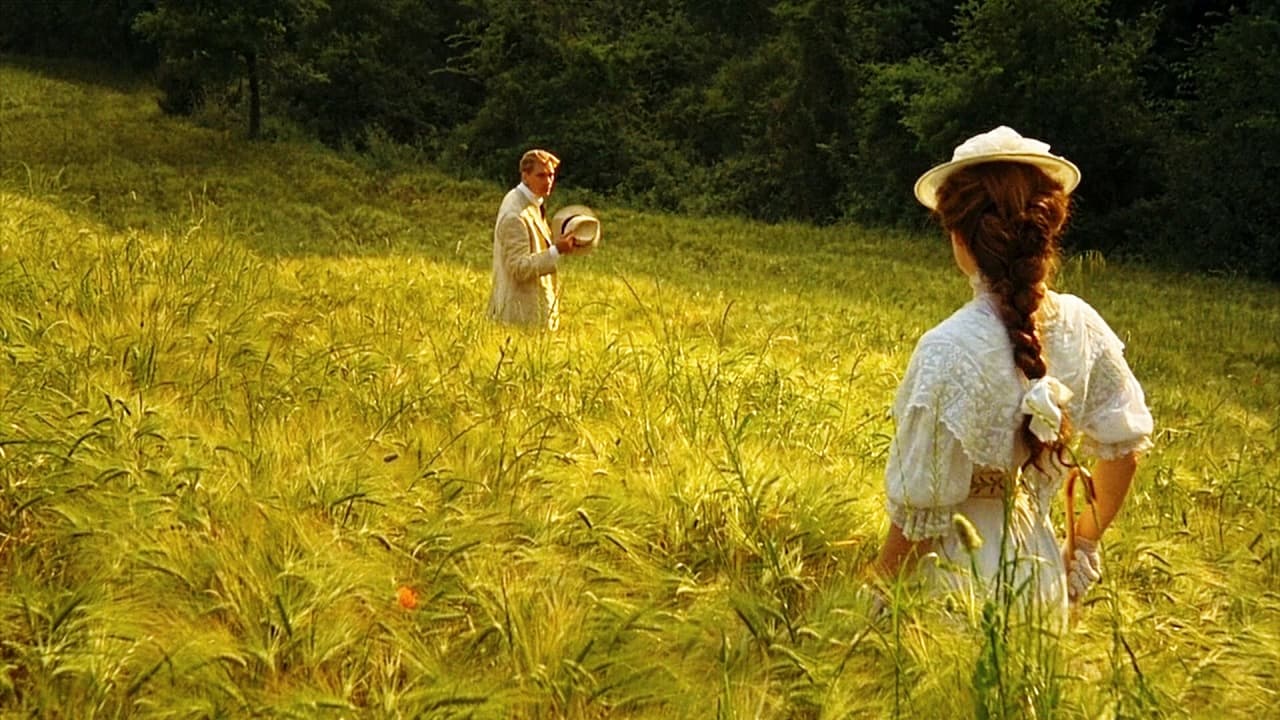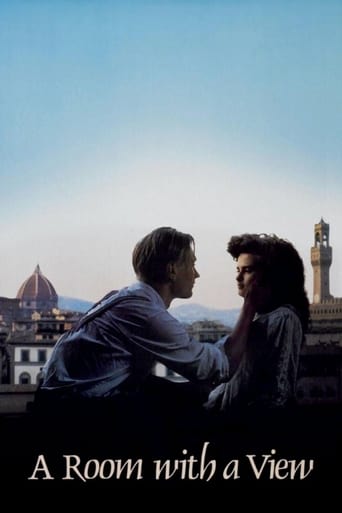

Lucy Honeychurch (Helena Bonham Carter) and her chaperon cousin Charlotte Bartlett (Maggie Smith) are in Italy. They're disappointed with the view from their rooms. Mr. Emerson (Denholm Elliott) is with his son George (Julian Sands) and offers to switch their rooms. Charlotte refuses due to conventional manners but Reverend Beebe changes her mind. Lucy is shocked by the wild Italian world and she faints witnessing a bloody fight. George comes to the rescue. Later, George kisses Lucy which could lead to a scandal. Lucy returns home and accepts the marriage proposal from snobby proper gentleman Cecil Vyse (Daniel Day-Lewis).It is a beautiful literary movie. It's the theatrical debut of Helena Bonham Carter and she delivers a great performance. This is not necessarily my type of movie. The story moves too slowly for me. A lot of the emotions are hidden. It's a nice start of a string of hits for Merchant-Ivory. I give it full marks for spotless workmanship.
... View MoreThe remarkable thing about the Merchant-Ivory productions (in fact a solid triumvirate if we count the writer Ruth Prawer Jhabvala) is that they're generally less about plots than characters, and so real they never seem to act according to a specific screenplay, but are rather conditioned by the two main forces of the story: space and time.Indeed, over the course of time, relationships are done and undone and the coldest heart can melt like Anthony Hopkins in "The Remains of the Day". "Howard's End" was much about an estate, symbolizing the rural roots of British aristocracy, before it surrendered to business-driven modernism. Generally set at crucial periods of British history, the Merchant-Ivory productions are about people who are the products of their age while a new one is coming, and they generally use their houses as a symbolic stronghold to resist the ineluctable changes.And "A Room with a View", adapted from E.M Forster's novel of the same name, is the metaphor of the very point the story makes. Even the smallest room can open onto a large town, the sky, the infinite, like so many paths one can take from life, if he or she dares to get rid of the weight of past and conventions. A room can be made of beds and austere furniture to welcome a young woman from a British hamlet, Lucy Honeychurch (Helena Bohnam Carter) and her restraining chaperon Charlotte (Maggie Smith), but it can offer a panoramic view of one of the most romantic towns in the world: Florence.And the first pages of this cinematic book open in Florence, in a small pension, where a group of vacationers meet. Miss Charlotte complains about the missing view in the room, to which, invited during the following dinner, a free-spirited man, Mr. Emerson (Delnhom Elliott) proposes to switch their rooms. Emerson came with his son, and both belong to another class, high enough to afford a voyage to Italy, but whose philosophical views suggest that they embraced the turn-of-century, contrarily to the Victorian Charlotte, who refused the proposal, shocked by Emerson's lack of tact, while his reaction proves that he meant no disrespect. She eventually accepts, convinced by other guests of the pension, Reverend Beebe (Simon Callow) and the old Allan sisters.This benign episode foreshadows the coming conflicts between the old and new order in England circa 1910, to which space and time provide crucial elements. The film is set during the Edwardian period; a sort of in-between decade where British people could nonchalantly enjoy the achievements of the more prestigious Victorian era, like a historical calm before the storm of the Great War. And being a film of dazzling imagery, the sight of these British vacationers enjoying a picnic in a Tuscan setting, savoring tea and bathing under a sepia summer sun, and a cool summer breeze, is an eloquent illustration of the quiet optimism that prevailed during that period.And this bourgeois idleness, combined with a natural setting, creates the perfect cocktail for a passionate romance, leading to the inevitable moment when the mysterious George Emerson, played by the handsome Julian Sands, gives a passionate kiss to an unchaperoned Lucy. She didn't see it coming, nor did she expect the kiss' everlasting effect, awakening the most passionate impulses. The kiss sweeps off all the conventions, the good manners that condemned Lucy to a life of rigidity, giving all its meaning to the setting in Florence, the most defining town of the Renaissance. Literally, George's kiss is Lucy's renaissance.But this is only the first act and back home; the kiss is already history after Charlotte's intervention. And when during the next scene, we meet Cecil Vyse, Daniel Day-Lewis as Lucy's future husband, a living caricature of snobbish prig with his oiled hair, rigid stature and annoying noise clip, we're puzzled but not surprised. The film doesn't embarrass itself with explanations and trusts us enough to connect the events together. So, regarding the mysterious choice of Cecyl as a husband, I guess, we should get back to the 'room with a view' metaphor.Indeed, with George, Lucy had 'a room with a view', with Cecyl, she would have thousands of rooms with no view at all. Breaking his eternally taciturn facade, George is given one opportunity to have a heart-talk with Lucy; he tells her that her marriage with Cecyl would turn her into an ornament, for the man would never be able to value her, or any woman for that matter. This is one of the outbursts of passion the film serves at the right moment to remind us that there is still a story after all, and a question: to which direction will Lucy's heart lean? And it's not just a choice between two men, but two orders, two states of mind, two kissing ways.Roger Ebert, in one of his most enthusiastic reviews, insisted on the conflict between heart and mind, passion and intellect. I wish he had a few words about space and time as either the restraining or catalyzing elements in our lives. It's restraining when you have characters with the privilege to enjoy some escapism in a beautiful Italian landscape, but are still tied to Victorian good manners, or catalyzing, when three men, including a priest, play like children in a lake, all naked. The swimming sequence is exhilarating, and the massive male nudity never bothers, a credit to the directing and the cast's performances.Of course, as enchanting as it is, "A Room with a View" is less politically oriented than other Ivory-Merchant productions while there was more to say about socialism, feminism, weight of traditions, bourgeois insouciance, but the specific pretension of "A Room with a View" was to depict another slice of British life, from which two hearts would converge in a small point of the world, a room with a view on the infinite, on the future, on love.
... View MoreI will gush over this film because it is worthy of praise and a standing ovation. A Room With A View is likely one of the most perfect films to grace screens in decades. The E.M. Forrester story produced and directed by the team of Ivory and Merchant brings the tale of Miss Lucy Honeychurch (Helena Bonham-Carter) to life in perfect Edwardian splendor. Wonderful locations of the Florence cathedral, Palazzo Vecchio, sculpture by Donatello, and an assortment of rolling landscapes are stunning visual fodder for this comic tale of Apolonian vs. Dionesian parlor manners. Exquisite young Bonham-Carter's casting as the virginal heiress is thwarted by her traveling companion, the venerable Dame Maggie Smith as her meddling biddy chaperon, Aunt Charlotte, with Dame Judy Dench as a proto-Jackie Collins author, Elenore Lavish, Daniel Day-Lewis as the prissy snobbish Cecil Vyse, and, a gorgeous, naked Julian Sands as socialist George Emerson comprises a most outstanding casting achievement. The excellent soundtrack offering of Dame Kiri Te Kaniwa's rendition of "O Mio Caro" takes your breath away as are the bits of wonderful piano solos that Lucy produces throughout the film. The cinematography is most wonderful with scenic panoramas of the far off Florence or Lucy sauntering through a field of poppies and wildflowers to receive the kiss to curl your toes from George Emerson, well, can romantic love get any better? This video is required for collectors of films of Julian Sands and Daniel Day-Lewis, however, its real value is as one of the finest of the Merchant Ivory magic touch in film making.
... View MoreI say its nearly perfect, but I really cant fault it for anything. The performances are uniformly exquisite, the visuals/scenery are magnificent, the script follows the classic novel - but keeps the humor, irony, and pathos open to a modern audience. It is the most accessible and most enjoyable of the Merchant & Ivory translations of classic works - and really elevates the magic of the original EM Forster novel. While the leads keep the story going, the smaller roles constantly keep you amused. The aged sisters, the carefree brother, the nervous mother, the vicar, the bold authoress, etc all provoke a smile. And the last 3 minutes are simply delightful.
... View More